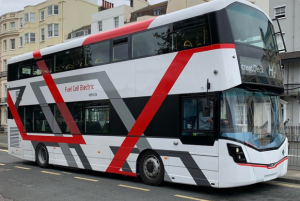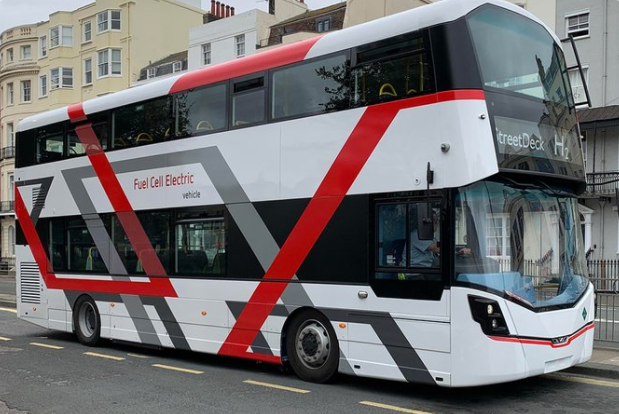Greater Brighton leaders are being asked to back more work on a switch to hydrogen for transport, heating and power with a £25,000 investment.

The money – from the Greater Brighton Economic Board – would be intended to help a group known as Hydrogen Sussex as it prepares to work up an “investment case” for the area.
As well as research, several practical projects are already under way including work on hydrogen-fuelled buses.
The economic board – which is made up of council, business and education leaders – will decide whether to commit the funds at a meeting next Tuesday (1 February).
In July 2020, the board approved the “Greater Brighton Energy Plan”, and three months it later pledged to “decarbonise” energy to achieve carbon net-zero targets.
A report to the Greater Brighton Economic Board said that last year the board provided more than £13,000 to fund Hydrogen Sussex which was set up in February last year.
The money was used to pay for training, website development and membership of an industry organisation.
The £25,000 would support the recruitment of a specialist consultant and the “commissioning of an initial hydrogen investment proposition and strategy”. This would be overseen by Brighton and Hove City Council.
The report to the Greater Brighton Economic Board said: “The proactive and forward-thinking work of Hydrogen Sussex and Greater Brighton, including the ambition to become a leading hydrogen region, will ensure that the city region is best placed to take advantage of these opportunities.
“A reactive or do-nothing approach would jeopardise the excellent work already done and potentially lead to future opportunities being missed.”
Hydrogen Sussex – made up of councils, businesses and universities – is expected to need more funding in the future and is seeking investment from commercial sources as well as the Coast to Capital Local Enterprise Partnership (LEP).
So far, Hydrogen Sussex has worked with Brighton University on potential hydrogen-powered large and public-sector vehicles, including bin lorries, buses and emergency vehicles.
The report said: “At the current time, it is crucial that the region is seizing the initiative to initiate, support and co-ordinate projects which will both help the environment and lead a sustainable economic recovery.”
The Greater Brighton Economic Board is due to hold a virtual meeting at 10am on Tuesday 1 February.










What is Hydrogen Sussex going to do that the private sector hasn’t achieved already?
London has hydrogen buses already and Metrobus has ordered them for Crawley.
See https://www.london.gov.uk/press-releases/mayoral/englands-first-hydrogen-double-deckers-launched
https://wrightbus.com/en-gb/go-ahead-buys-its-first-zero-emission-hydrogen-buses
Hydrogen is a far more effective alternative compared to batteries.
That would cause a problem for B&H council though.
They have started painting parking slots with green sludge for battery charge locations. What would they do if hydrogen was the norm?
Bless.
Chaz, your comments are often rather stupid. Perhaps you’ve never left Brighton and only read local news, so don’t understand the transition to EVs has already started and is well underway. It’s hardly a Brighton council thing. Hydrogen might just about make sense for large vehicles but it is very wrong to say it is more effective than batteries…how do you think Hydrogen is created? It requires an awful lot of electricity and then it needs to be transported to where it’s needed, which can be incredibly inefficient.
Ahh, the Streetdeck. There are too many saefty features which make them annoying to drive. Going up hills and trying to keep it in the same gear and the gearbox decides to change up, then down, then up, down, up down, then… up followed by down DOWN…
Brakes aren’t that hot either. The older Scanias have better brakes.
Yes, as a passenger I often find myself concerned that my bus is too safe, not to mention too annoying for the poor driver.